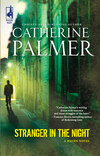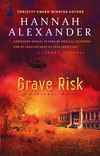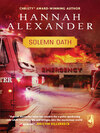Kitabı oku: «Silent Pledge», sayfa 6
“I don’t think so, honey.” Mercy sighed and glanced at the clock. She’d only slept three hours. This was going to be another tough one. Now she would lie awake and worry that she wasn’t giving her daughter enough attention, that too many of her patients were falling through the cracks, and that if she did get back to sleep she might miss another emergency call. Had she done the right thing keeping Odira and Crystal here at the community hospital?
And if she continued to worry like this, would she ever sleep again?
Tedi’s rhythmic breathing deepened and her body relaxed. Mercy couldn’t even close her eyes. So she started doing what she’d been practicing lately when the nagging specter of insomnia attacked her—she prayed. And she began with a prayer for Lukas to return.
Lukas struggled with his frustration as he returned to the E.R. proper. All his life he’d wanted to be a doctor, although when he was growing up he envisioned himself as the faithful family practitioner who had an office attached to his home, who made house calls and whose wisdom and compassion alone could make people feel better. He’d watched too many Marcus Welby, M.D. reruns. By the time he reached his third year of premed, he’d been forced to acknowledge that medical practice wasn’t what it used to be. Still, being a doctor was all he’d ever wanted to do.
It wasn’t until his first experience in an emergency room during fourth-year rotations that he felt the adrenaline rush of life-and-death decisions. He’d been addicted ever since. He could get high on a successful pediatric code. His heart could break at the death of an elderly nursing-home patient. And it was still all about people.
People were also what made the job difficult. There were so many extremes, and so many burnouts, and he kept in mind that it could also happen to him. His first burnout with people had come before his ninth birthday.
When he was a skinny, shy kid of eight, he’d had to get glasses. His two older brothers picked on him and teased him when their parents weren’t watching. Because of that, he remembered backing further and further into a shell until he barely spoke to anyone at all, and their teasing only grew worse.
One day Dad took him on a walk, just the two of them, out through their vegetable garden to a small grove of apple trees that always produced the crispest, sweetest apples in the farming community where they lived.
Dad picked an apple from the tree and held it out to Lukas. There was a brown, worn-looking spot near the top. “See this, Lukas? The apple grew too close to the branch, and that branch rubbed against it when the wind blew. Some years these are the apples I like the best, because a lot of times they seem to have the sweetest taste.”
Lukas took a bite of the apple, grimaced at the hard bitterness and heard his dad chuckle.
“Oh, yeah, I forgot to mention something,” Dad said. “Strange, isn’t it? The same rubbing that makes a lot of the fruit sweet some years can also make the fruit bitter and hard other years. Guess it has to do with how much sunshine they’ve had.” He placed an arm around Lukas’s shoulders. “Anyway, that’s my opinion. People are like that, and you’re not too young to learn the lesson. God’s love is your sunshine, you know. Just let Him shine through you in spite of the bad weather and the teasing you always get from your brothers. You’ll be glad you did.”
And so as Lukas approached Carmen at the front desk he forced a smile. This was her first office job, and she was understandably nervous, especially with the unforgiving attitude of many of the staff. Her harried expression always seemed on the verge of panic when an ambulance came in or when Lukas gave orders. She was one of the youngest on the staff.
“How’s it going, Carmen?” he asked as he stepped up to the computer where she worked.
She jerked and looked up at him, her fingers fumbling on the keyboard. Her gaze darted quickly to an item on her desk, then away again. “Fine, Dr. Bower. The coroner’s on his way, and Quinn and Sandra took off a few minutes ago. Tex finally went to grab a bite because she’s starving, and nobody else has checked in.” She got to her feet, eyes wide, movements nervous.
Lukas wished the poor woman could relax a little. If she didn’t, she wouldn’t last here very long. He frowned and glanced again at an item on her desk that he’d noticed earlier—a blue-and-white tube of surgical jelly.
He shrugged and started to walk away when the phone buzzed beside Carmen’s left elbow. She jumped and jerked it up, answered sharply and listened, catching Lukas’s gaze. When she thanked them and hung up, she shook her head. “That was Sandra. She and Quinn went back to the apartments where they found Marla. Did you know that’s where the bikers are staying? The police checked the place out. They found baby stuff, but no baby. A couple of the neighbors heard the commotion and came out. They said they’d heard a baby crying for a while, but they’d gotten used to that in the past couple of days. Nobody can find anything now.” She shrugged and sat back down in front of her keyboard.
Lukas stared at her. “But they’re still looking, right?”
She repeated her shrug. “I don’t know, Dr. Bower. Quinn said the police are busy tonight. Maybe they just don’t have time to look.”
Lukas glanced at the wall clock. It was 4:00 a.m. Sunday and freezing outside. “Where could a newborn baby possibly be? Surely if someone found a baby they’d call the police immediately.”
“You would think,” Carmen said darkly, “but I’ve already heard some rumors. You know the little girl who disappeared from the park last week? Some people think she was kidnapped. Quinn told Sandra there was a black-market baby ring in the area, and he thinks those bikers have something to do with it. I wouldn’t put it past them.”
Chapter Seven
A t seven o’clock Sunday morning, Mercy Richmond walked down the second-floor hallway of Knolls Community Hospital. Her stomach growled at the aroma of breakfast. She listened to the clatter of plastic and the clink of china and glasses as the aides collected trays from the fifty-three private-room patients. Census was up. Foot travel was heavier than usual, and the low rustle of charts and papers in the nurses’ station and the talk and laughter from televisions in the rooms were more pronounced.
“There you are!” came a deep female voice behind her, and she turned to find Mrs. Estelle Pinkley, hospital administrator, stepping around a tall kitchen cart.
Mrs. Pinkley, a few years past retirement age, had the bearing and vitality of a college student. Her white hair, feathered back from her face in feminine lines, exposed a high forehead. She was as tall as Mercy’s five-eight, and she always made Mercy feel dowdy. Today she wore an elegant blue dress with a cowl neck. The blue brought out highlights in her lively and intelligent gray eyes. If Mercy made it to church at all this morning, she would wear what she had on—blue jeans and a red cable-knit sweater.
Estelle showed few outward signs of the injuries she had sustained in the October explosion. The general public was seldom aware that arthritis, from which she’d suffered for several years, now concentrated itself on her injured arm and leg during flare-ups. People usually didn’t know what took place in her personal life unless she revealed it. For instance, everyone in Knolls knew she was an ethical lady who made intelligent decisions. Everyone knew she was a churchgoer. Few people knew that she and her husband dedicated the majority of their combined income to support three missionaries—one in Minsk, Belarus; one in Guatemala; one in China. And she seldom displayed the scope of her biblical knowledge here at the hospital.
Estelle reached out and drew Mercy with her into the small conference room beside the nurses’ station. The heady aroma of freshly brewed coffee filled the room. Mercy took a deep whiff. The smell was wonderful. Coffee was off her diet, however. Lately it had been giving her the jitters.
“I’ve just been on the telephone talking to our contractor,” Estelle said.
“This early on Sunday morning?” Mercy said dryly. “I’m sure he appreciated the call.”
“He didn’t complain.” Estelle reached into her pocket, pulled out a dollar and deposited it in a collection cup for the purchase of future refreshments for staff. Then she picked up the coffeepot and filled a clean mug. “He has a good head for business. He’s polite, and he knows how to get the most out of his workers. I wish more of our directors were like that. We’re ahead of the initial schedule by at least three weeks.” Estelle’s sharp, decisive voice with its gravelly timbre held the familiarity of some of Mercy’s earliest memories. Estelle and Mercy’s mom, Ivy, had been friends since they attended Knolls Elementary School together.
“He hired three more men last week at my request,” she continued.
“Why do that if they’re already ahead of schedule?”
“Because I want the job done sooner. I hope to see our emergency department up and running by the end of February if possible.”
“You’ll probably get what you want,” Mercy said.
A pleased smile flitted across Estelle’s face and was gone quickly. When she was in fighting form—which was all the time, even right after her near-death experience in the explosion—she could take on an Angus bull.
“I see you’re still working out of the storeroom,” Mercy said.
Estelle took a sip of the coffee and grimaced. “And that is where our offices will stay until the rest of the hospital is complete. Patients come before carpeting and wallpaper, and if anyone wants to complain, they can come and talk to me.”
Mercy laughed. “If that happens I want to be there to see it.” Before Estelle became hospital administrator five and a half years ago, she had been prosecuting attorney for Knolls County. A handful of people in the area who had found themselves on the wrong side of the law resented her. The rest loved and respected her, and Mercy was one of them. Estelle represented safety and stability in their small town, and Knolls Community Hospital was now one of the best small hospitals in the state—and would be again, once the damaged areas were rebuilt.
“So,” Estelle said with a penetrating look at Mercy, “I don’t like the looks of those dark circles under your eyes. Can you get Lukas back here to help us out until then? Both of us need him.”
Mercy felt the truth of those words, but she knew her own personal need to have him in her life was not what Estelle meant.
The administrator put the coffee cup down and poured in some powdered creamer, stirred it, tasted again, and nodded, satisfied. “Think of your patients if you refuse to think about your own health. We need our E.R. doctor available for them. Even with the additional lab and X-ray capabilities in your clinic, you can’t do it all yourself. There isn’t another E.R. within an hour of here.”
“There are other doctors in town.”
“Yes,” Estelle snapped, “and they’re complaining about being overworked, but I don’t see any circles under their eyes.”
“They aren’t going through menopause,” Mercy said.
“Maybe you wouldn’t be, either, yet, if you didn’t have so much stress. We need another doctor, and Lukas should realize that just by talking to you.” She paused and gave Mercy a thoughtful, penetrating glance. “You two are still seeing each other, aren’t you?”
Sometimes Mercy wondered if Estelle had some mind-reading ability. “Mom’s been talking to you about me again.”
Estelle shrugged. “Ivy knows you’re being overwhelmed at the clinic. She worries about you.”
“That doesn’t give her any rights to interfere in hospital politics.”
“She’s doing what any concerned mother would do.”
Mercy could only shrug and shake her head. Her mother was a generous benefactress of the hospital, and sometimes, when she found some strings she wanted to pull, she used her advantage.
“I’ve taken steps to help with the overload,” Mercy said. “I hired Lauren McCaffrey to work at the clinic until the E.R. is operational again. She’s a good E.R. nurse. She’s taking up a lot of the slack.”
“She’s not on call twenty-four hours a day like you are,” Estelle said. “Get Lukas back here, for all our sakes.”
“I’m not sure he wants to come back.”
“Then convince him otherwise.”
“He’ll listen to you before he’ll listen to me.”
Estelle studied Mercy’s face for a moment and gave an astute nod. “But he’ll listen to you with his heart.” She laid a hand on Mercy’s shoulder and squeezed. “Bring him home, my dear. It’s where he needs to be.” She glanced at her watch. “I must get to early service before they start praying for my wayward soul. Then I have a day’s work in my office to complete.”
“Sounds like you need to practice what you preach,” Mercy said.
With a final pat on Mercy’s shoulder, Estelle poured the leftover coffee into the tiny sink in the corner, rinsed the cup in the sink and strode out of the room, leaving the scent of lavender in her wake.
Before Lukas ended his shift at 7:00 a.m. Sunday morning, he had treated three babies ranging from two weeks to three months. Their cries haunted him and made him think, once again, about Marla Moore’s missing baby. Judging by the conversation he overheard from other staff members, most people supposed the child had been kidnapped. Much suspicion hovered over the presence of the bikers so close to the scene of disappearance. The landlord was questioned at length, and the authorities had decided to autopsy Marla.
Lukas had been told by the police that the Missouri Special Crimes Unit had been called in. The delivering physician had been contacted and gave more information about Marla. She was nineteen, alone, frightened. The baby’s name was Jerod Andrew Moore. There was no father listed. Maternal grandparents were both deceased.
While treating the final patients of the shift for the usual assortment of January colds, influenzas and strep throats, Lukas hadn’t been able to forget the young woman’s deathly pale face.
He was just sitting down at the small workstation next to the nurses’ desk to chart his last patient when he heard a husky, easily recognizable female voice behind him.
“So…have they started initiation yet?”
He turned to see Tex striding toward him from exam room two, her scrubs stretched tightly across her shoulders. She did resemble her cousin, Lauren, in a superficial way, with those green eyes, straight white teeth and high cheekbones. But where Lauren had a delicate beauty that attracted men wherever she went, Tex had an independent nature about her that said “Back off.” Her physical stature added to the impression, with a voice to match, and a glare that could send a strong man reeling. She hadn’t aimed her look at Lukas, but he figured Quinn’s days were numbered.
“Initiation?” Lukas asked.
She pulled her chair out, turned it around and straddled it as if she were riding a horse. “We’ve got some juvenile delinquents on staff here that try to pass for human beings. They like to play practical jokes on the new guys, and you’re the newest.”
Lukas thought about the peanut butter sandwich he’d thrown away. “What kinds of practical jokes?”
“They let the air out of Dr. Moss’s tires and unscrewed the back of his chair so it would fall off when he sat down. They covered his suede jacket with tape, which ruined the material when he pulled it off.”
Lukas nodded. He wasn’t surprised.
“Dr. Moss was nice about it,” she said. “If they’d done that to me, I’d’ve hung ’em out to dry.”
Lukas signed the chart he was working on, added it to the small stack and reached into the desk for his keys. It was Sunday morning, and tired as he was, he wanted to attend a worship service somewhere. He just hoped he could stay awake long enough not to snore through the sermon.
“Where are the churches around here?”
There was no answer.
He turned his head and ran straight into Tex’s hard stare.
“Tex?” What was wrong with her? “Any churches in Herald?”
“Why would you want one of those?” Her voice had suddenly cooled several degrees.
Lukas frowned and glanced at his watch. Yes, this was Sunday morning. “I thought I might pray for Jerod Moore, among other things.”
She shook her head in a slow, sad rhythm. “You’d be better off doing that at home by your bedside.” She got up from the chair and rolled it back where she’d gotten it. “While you’re at it, you might pray for the kid that disappeared from the park last week, and the ones who disappeared in Sedalia and Columbia. Nobody’s prayers have been answered for them yet. See you next shift.”
Clarence woke himself with a loud snore, his head lolling back against the headrest in Buck’s truck. He raised his head and caught sight of the Knolls city limit sign. Wow. He must’ve slept the past twenty miles. He glanced over at Buck. “Sorry, pal, I guess I snoozed a little. I was hoping to help you stay awake.” He stretched his heavy arms and reached up to rub his cramping neck. “You doin’ okay?”
Buck nodded, his eyes bloodshot and drooping from fatigue. “I’m used to it.”
Clarence knew that was right. Since Buck was a firefighter and first responder who worked twenty-four-hour shifts, he had to do this a lot, but not right after his wife had tried to kill herself. Besides, he’d just finished a long shift a few hours before all this happened.
“Guess you’re gonna go home and get some rest now,” Clarence said.
Buck turned at the first stop sign and headed toward Ivy Richmond’s house. “I don’t know.” He took one hand from the steering wheel and rubbed it across his beard-stubbled face. “I keep hoping I’m really already asleep and that this is just a bad nightmare.”
“I hear you there. Been lots of times I wished the same thing. There’s something Ivy keeps telling me, though, and I’m about decided it’s true.” Clarence looked out the window at the opalescent morning light. “She says this life isn’t what counts. What you do counts, and what you believe counts, but not what happens to you here.”
Buck leveled him a sideways glance and turned onto the street where Ivy lived. “Sounds kind of rough to me. Is that how I’m supposed to get through this thing with Kendra? Just tell myself it doesn’t matter?”
Clarence frowned. That didn’t come out right. “I don’t think that’s what Ivy meant. What she’s been telling me all these months, while I’ve been starving on this diet and Darlene’s been trying to take better care of her asthma, is that God—you know, Jesus and all—cares a lot about us. It’s like He’s the big boss, and He knows what’s going to happen, even though we don’t. You know, like He’s got His own plans for us, and sometimes we just need to kind of ride along and see what happens.” He wasn’t sure how he felt about all that yet, but Ivy’s harping was starting to soak in. Somehow a little of what she said made sense to him.
Buck turned into Ivy’s driveway and pushed the buttons to unlock the doors so Clarence could get out. “I don’t know.”
“Me neither, but I’m starting to think there’s something to this prayer stuff. When we prayed up there in Springfield, didn’t our prayer make things better for a while? Didn’t Kendra stop crying?”
Buck thought about the question so long that the front door of Ivy’s house opened and Ivy stepped out onto the porch. Her long salt-and-pepper hair was drawn back in a braid, and she wore a red wool sweater pulled down over a long matching skirt. Ivy Richmond cleaned up good for a sixty-six-year-old woman. Actually, she cleaned up good for any age.
“But it didn’t last, Clarence,” Buck said finally.
Clarence looked across the seat at his friend. “Then maybe we’ve just got to keep praying.” He opened the door and heaved his heavy body out onto the concrete drive.
“Don’t guess it could hurt,” Buck said. “Lauren McCaffrey used to tell me she was praying for me, back when Kendra kicked me out and I was suspended from the department. Afterward I sometimes wondered if everything turned out okay because of those prayers. But look what’s happened now.” He spread his hands, then dropped them back onto the steering wheel. “Kendra wants to die.”
“But she’s not dead. Think about that, Buck.” Clarence closed the door and waved his friend off, then turned to face Ivy.
Mercy entered the room where Crystal Hollis and her great-grandmother, Odira Bagby, had been brought the night before. And then she smiled. Since all the rooms here at Knolls Community were private, Mercy had been afraid Odira would have to sleep on one of those chairs that folded out into a sleeper—not a comfortable situation for a woman who had weighed in at two hundred seventy pounds on her last medical visit. Some sweet soul had moved another hospital bed into the room and set it up beside Crystal’s so Odira could be close to the little seven-year-old during the night. Probably the night charge nurse, Vickie. She was one of the best additions they had made in this hospital in the past few months—except for Lukas Bower.
Two empty food trays waited for pickup on the tray table, and Crystal lay on her bed with her head propped up, her soft brown hair combed and hanging straight to her shoulders. She didn’t have the television on, but her water-blue eyes were open and alert, and they fixed on Mercy as soon as she walked in.
Mercy saw a children’s book lying facedown on the rumpled blankets of the other bed. Most likely Odira had been reading aloud.
“Good morning, Crystal. Where’s Gramma?”
Crystal pointed toward the hallway. “She went to ask the nurse when you were coming.” Her serious gaze did not leave Mercy’s face. “She wants to see if you’ll let us go home today.”
“Okay, I’ll get the preliminaries over and talk to her when she comes back.” Mercy pulled the stethoscope from around her neck and warmed the instrument in her palm for a few seconds. “How have you been feeling this morning?”
“I feel better, Dr. Mercy.” Crystal took a deep breath and exhaled to demonstrate. She didn’t cough. Her face was back to its normal pale color.
“Good.” Mercy glanced at the empty food trays. “Did you eat all your own food?”
“Yes, and some of Gramma’s.”
Mercy smiled. That would have been a loving sacrifice for Odira. “Then I see your appetite is back to normal.” She checked the nurse report on the clipboard at the end of the bed. Crystal had been given another breathing treatment this morning, her coughing had slowed considerably, and her temperature was 99.4.
Mercy was just finishing with Crystal when Odira came in huffing, her face damp with perspiration, clumps of gray-brown hair clinging to her forehead. “Hi, Dr. Mercy! I was just tellin’ Crystal you’d probably be here anytime.” Her voice, as always, was strong, but her breathing was louder and more labored than usual. Her face was flushed, and she moved more slowly. “I think she’s feelin’ better today, don’t you?” Odira patted her great-granddaughter on the arm and leaned down to kiss her forehead. “I always did say, in spite of it all, she’s a fast healer. How’s those lungs sound to you this morning?”
“Much better.” Mercy replaced the clipboard and adjusted Crystal’s blanket.
“Think we’ll get to go home today?” Odira picked up the open storybook and lowered herself slowly onto the hospital bed beside Crystal’s.
Mercy watched the woman’s movements in silence for a moment. Twice last night, while Mercy had been giving Crystal her treatments in the clinic, Odira had quietly pressed her hand against her chest and winced. Her face was puffy, and her feet bulged out over the tops of her loafers.
And Crystal—observant child that she was—watched with worried eyes. Something was going on here.
“I’d like to keep you here at least another night,” Mercy said, patting Crystal’s arm.
Odira’s expression drooped. “Oh.” She huffed a couple more times. “Can’t tell you how much I appreciate you, Dr. Mercy, but you know how dangerous it is for Crystal to be in here with all the germs floating around. I’ve been told hospitals are the worst place to pick up pneumonia. She picks up any little bug so easy, what with her cystic fibrosis.”
Mercy nodded. “I’m sorry. I understand your concern. Our staff is always careful to prevent the spread of germs, but where you have illness, you will have contagion. It may help you to know that our hospital is well below the national average for hospital-acquired illnesses.” She stepped over to Odira’s bed, pulling a small bottle out of her lab coat. “Here, I brought this for you.” She handed the plastic container to Odira. “It’s hand purifier. I want you and Crystal both to rub it on your hands several times a day while you’re here, and then when Crystal goes back to school I want her to take it with her and use it. There are also dispensers on the hallway walls.”
She watched Odira open the bottle and pour a little glob into her hands, then reach over and give some to Crystal.
That simple act could be a potential lifesaver for someone with CF. People didn’t realize how dangerous a cold could be to this child. Even Mercy had to remember, when Crystal came to see her at the office, not to take the chance of spreading germs that might linger on her clothing from other patients. She always put on a fresh lab coat when Crystal came in because the little girl needed a loving touch.
“And how’s Gramma holding up through all this?” Mercy asked, trying to keep her voice casual. She found it hard to believe Odira was close to Mom’s age—not old at all. “Are you a little tired?”
“Who, me? I’m just as fine as can be.” Odira’s words didn’t hold as much energy as they usually did when Mercy asked her that. The woman hastened the drying of the hand purifier by waving her hands in the air; then she reached down and thumbed through the pages of the storybook in her lap. She did not look at Mercy.
Mercy continued to watch her. “You know, Odira, it’s been a while since your last checkup. We want to make sure to keep you in running order so you can take care of Crystal.”
Odira grunted. “Nothin’s wrong with me that a nice bed at home won’t cure.”
Mercy glanced at Crystal and saw growing concern in the little girl’s eyes at the continued questions about Odira’s health. “Odira, why don’t you and I go for a stroll down the hallway? You could use some exercise after being cooped in this room all this time.”
Odira turned her uncertain gaze toward her great-granddaughter. “Not sure I oughta leave Crystal here all alone. And what if I was to pick up some disease and pass it on to her?”
The woman was hedging. “We can be careful. I’ll call an aide to sit with her for a few moments.” Mercy nudged Odira’s leg. “Come on, it’ll do us both some good.” Maybe while they were on their walk Mercy could convince her to submit to an exam. Odira’s health now, and not Crystal’s, prompted Mercy to keep them here for another day or two.
Ücretsiz ön izlemeyi tamamladınız.















